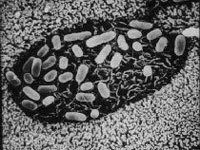M cells (Membranous / microfold cell) are flat cells that are a specialized antigen-carrying cell interspersed between intestinal mucosal epithelial cells. It does not express MHC class II molecules, cytoplasmic lysosomes are few, and there are short irregular brush-like microvilli on the surface of intestinal mucosa. It has a high degree of non-specific lipase activity. Foreign antigenic substances such as pathogenic bacteria can be taken up by the adsorption of brush-like microvilli on the surface of M cells or by the action of proteases on the surface of M cells. The mucosal immune system plays a major role in protecting the mucosal surface from pathogens and promoting symbiosis with the symbiotic microbial community. To stimulate the mucosal immune response, the antigen on the mucosal surface must first pass through the impermeable epithelial barrier and enter the lymphoid structure such as the "Pyle's nodule". This function (called "transcytosis") is thought to be mainly regulated by M cells, which are specialized epithelial cells in the "Pyle's nodule." A study of the mechanism of M-cell-mediated antigen "transcytosis" showed that glycoprotein-2 expressed on the top surface of small intestinal M cells is a transcytosis receptor for bacteria expressing FimH antigen. Since M-cells are considered to be a promising target for various oral immunization drugs, this work shows that "transcytosis", which depends on glycoprotein-2, is a possible immune target. Porcelain With Decal,Vintage Ceramic Decals,Ceramic Decal Paper,Custom Ceramic Decals Henan WonkingChina I/E Co., Ltd. , https://www1.wshousewares.com
The role of small intestinal M cells in immune response